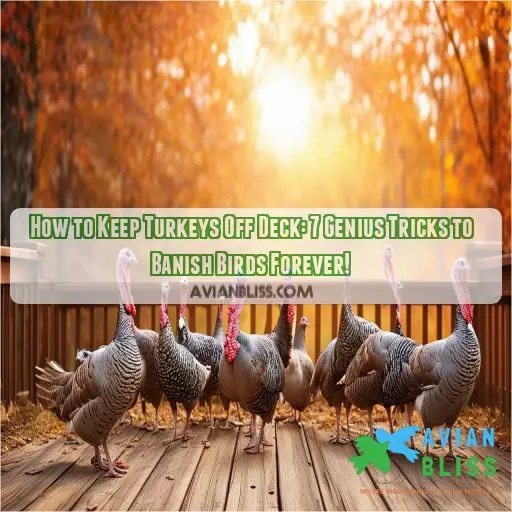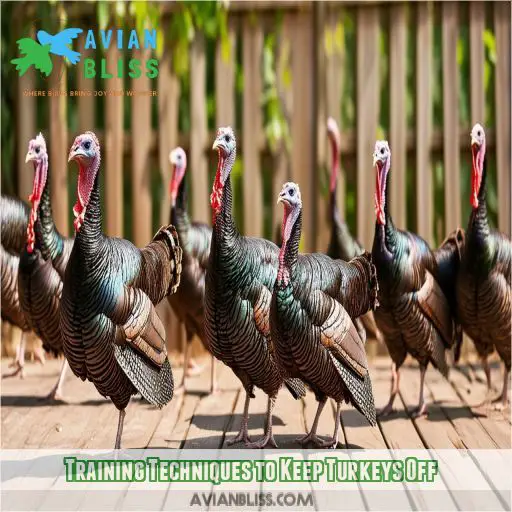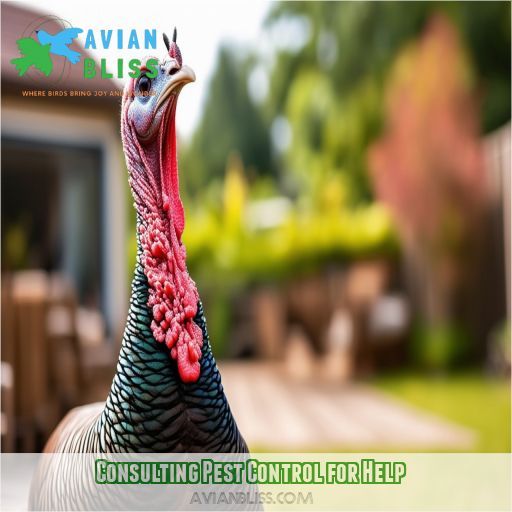This site is supported by our readers. We may earn a commission, at no cost to you, if you purchase through links.

You’re not alone in this battle. Keeping turkeys off your deck can seem like an impossible task, but fear not!
We’ve compiled 7 genius tricks to banish these persistent birds forever. From clever deterrents to strategic design choices, you’ll discover effective ways to reclaim your outdoor space and enjoy a turkey-free zone.
Let’s take a look at these foolproof methods to keep turkeys at bay.
Table Of Contents
- Key Takeaways
- How to Keep Turkeys Off Deck?
- Turkeys on Your Deck: a Real Nuisance
- Effective Scare Tactics for Keeping Turkeys Away
- Long-Term Solutions for Preventing Turkey Return
- Utilizing Motion-Activated Sprinklers
- Using Visual Deterrents and Sound Devices
- Training Techniques to Keep Turkeys Off
- Strategic Deck Design Considerations
- Importance of Cleanliness and Timing
- Consulting Pest Control for Help
- Frequently Asked Questions (FAQs)
- How do I keep turkeys off my deck?
- What do turkeys hate the most?
- What smells do turkeys hate?
- Will a fake owl keep turkeys away?
- Are certain turkey breeds more likely to invade decks?
- How do turkeys impact local ecosystems when relocated?
- Can turkey-repelling plants also harm other wildlife?
- Do turkey deterrents affect property values or aesthetics?
- Are there laws restricting turkey control methods?
- Conclusion
Key Takeaways
- Turkeys may be gobbling up your peace of mind, but fear not! A combo of shiny objects, sudden noises, and a surprise sprinkler shower can turn your deck from a turkey nightclub to a no-fly zone.
- Don’t be a turkey when it comes to yard work. Keep things trim and tidy – these birds prefer a messy all-you-can-eat buffet, not a five-star dining experience with nowhere to hide.
- Sometimes, you’ve got to fight fire with water. Motion-activated sprinklers are like ninja guards for your deck, ready to give those feathered party crashers an unexpected bath.
- If all else fails, don’t be too chicken to call in the pros. Pest control experts have tricks up their sleeves that’ll make even the most stubborn turkey say, "Maybe I’ll crash someone else’s deck party.
How to Keep Turkeys Off Deck?
To keep turkeys off your deck, employ a multi-pronged approach.
Start with scare tactics like hanging shiny objects (CDs, pinwheels) and using motion-activated sprinklers.
Create an unwelcoming environment by trimming bushes, removing food sources, and installing bright lights.
Visual deterrents such as reflective tape and scarecrows can be effective, especially when combined with sound devices emitting unexpected noises.
For long-term solutions, consider strategic deck design with elevated structures, smooth surfaces, and minimal perching spots.
Consistency is key in training turkeys to stay away, so maintain your efforts.
With these techniques, you’ll transform your deck from a turkey hangout to a peaceful oasis.
Let’s explore these methods in more detail.
Turkeys on Your Deck: a Real Nuisance
You’ve got a problem, and it’s got feathers.
Turkeys on your deck aren’t just uninvited guests; they’re full-blown squatters. These wild birds have turned your outdoor oasis into their personal playground, and it’s time to reclaim your territory.
Turkeys can be more than a nuisance; they’re potential property destroyers and safety hazards. Their droppings create a slippery mess, while their sharp claws can scratch up your deck’s surface.
Plus, these birds aren’t known for their table manners – they’ll make a buffet out of your carefully tended garden.
But don’t throw in the towel just yet! There are solutions to send these feathered freeloaders packing. It’s time to ruffle some feathers and take back control of your outdoor space.
Effective Scare Tactics for Keeping Turkeys Away
Ready to give those pesky turkeys the boot? Let’s get into some genius scare tactics that’ll have them running for the hills. Turkeys might be big birds, but they’re easily spooked. Here are four fail-safe methods to ruffle their feathers:
- Hang shiny objects: CDs, pinwheels, or aluminum pie plates will do the trick.
- Install a motion-sensitive sprinkler: Nothing says "scram" like an unexpected shower.
- Create a cacophony: Wind chimes, radios, or even your best turkey gobble impression can work wonders.
- Use reflective tape: This flickering deterrent will have turkeys thinking twice.
Long-Term Solutions for Preventing Turkey Return
While scare tactics can work wonders, you’ll want long-term solutions to keep those pesky turkeys at bay.
Start by giving your yard a makeover. Trim those bushes and keep your grass short – turkeys hate feeling exposed.
Next, tackle their food sources. Ditch those ground-level bird feeders, or at least invest in spill-proof ones. Trust me, spilled seed is a turkey’s all-you-can-eat buffet!
For roosting areas, try hanging polypropylene bird netting. It’s like an invisible force field for turkeys.
Don’t forget about lighting – bright lights can disrupt their sleep patterns and make your deck less appealing.
Utilizing Motion-Activated Sprinklers
You’ve tried everything, but those pesky turkeys keep invading your deck.
Enter the motion-sensitive sprinkler: your new secret weapon in turkey control. These clever devices are like ninja guards for your outdoor space, ready to give a surprise shower to unsuspecting birds.
Strategic placement is key – position them at entry points for maximum impact. Adjust the timing and range to catch turkeys off-guard, leaving them wet and bewildered.
While the initial cost might make you hesitate, think of it as an investment in your sanity. Plus, it’s a humane wildlife control method that’ll have you chuckling as turkeys dash away, feathers dripping.
Using Visual Deterrents and Sound Devices
While motion-activated sprinklers can be effective, visual deterrents and sound devices offer another layer of defense against those pesky turkeys.
You’ll want to create a turkey-unfriendly environment that’ll make them think twice before strutting onto your deck.
Hang shiny objects like reflector tape or holographic bird deterrents around your outdoor space. These will catch the light and create unsettling flashes that’ll keep turkeys on their toes.
Don’t forget about sound devices – a sudden burst of noise can startle even the bravest bird.
Try setting up noise makers or speakers that emit loud, unexpected sounds.
For a classic approach, consider placing a scarecrow on your deck.
Combine these scare tactics with other methods, and you’ll be well on your way to a turkey-free zone.
Training Techniques to Keep Turkeys Off
While visual deterrents and sound devices can be effective, training techniques can help you take control of your turkey problem. By understanding bird behavior, you can create a lasting deterrent effect. Here are four key strategies to train turkeys to stay off your deck:
- Remove all food sources, including bird seed and kitchen scraps
- Use negative reinforcement with a water hose when turkeys approach
- Consistently make loud noises to startle them
- Trim roosting trees to make your property less appealing
Strategic Deck Design Considerations
To discourage turkeys from settling on your deck, consider strategic design elements that make the space less appealing to birds. You can elevate your deck, use smooth surface materials that are difficult for turkeys to grip, and minimize perching spots by avoiding flat ledges or surfaces where they can comfortably rest.
Elevated Deck Design
Elevate your deck to outsmart those pesky turkeys! A higher deck makes it harder for them to hop up. Consider these design elements:
| Feature | Purpose | Effectiveness |
|---|---|---|
| Height | Deter | High |
| Railings | Barrier | Medium |
| Steps | Control | Low |
Your elevated sanctuary awaits!
Smooth Surface Materials
You’ll want smooth surface materials for your deck to deter those pesky turkeys. Opt for slick options like polished concrete or glossy tiles. These slippery surfaces make it tough for birds to grip, turning your deck into a no-landing zone for feathered visitors.
Minimizing Perching Spots
You’ll outsmart those pesky turkeys by designing your deck to minimize perching spots. Here’s how:
- Avoid flat surfaces and ledges
- Install sloped railings or caps
- Use spikes or wire on potential roosting areas
Say goodbye to unwanted feathered guests!
Importance of Cleanliness and Timing
You’ve got the tricks up your sleeve, but timing and cleanliness are your secret weapons in the turkey tango.
Keep your deck spick and span, as if you’re expecting the Queen for tea. Turkeys aren’t fans of tidy spaces, so make yours shine like a new penny.
Consistency is key – maintain your deck like clockwork to prevent these feathered party crashers.
Timing’s super important too; turkeys are creatures of habit, so disrupt their routine. Hit them with your deterrents when they least expect it.
It’s like playing chess with birds!
Consulting Pest Control for Help
Keeping your deck clean and timing your deterrent efforts are important, but sometimes, even your best efforts fall short. That’s when it’s time to call in the cavalry. Pest control experts are your secret weapon in the battle against turkey invaders. These licensed professionals bring a wealth of knowledge and specialized tools to the table. Here’s why consulting pest control can be a game-changer:
- Expert assessment of your unique situation
- Access to professional-grade turkey deterrents
- Humane and effective wildlife removal techniques
- Ongoing support and follow-up services
Don’t let stubborn turkeys ruffle your feathers. A pest control service can provide solutions specific to your needs to keep these feathered foes at bay. Remember, there’s no shame in seeking professional help – it’s often the smartest move you can make in your turkey-free deck quest.
Frequently Asked Questions (FAQs)
How do I keep turkeys off my deck?
To keep turkeys off your deck, try using visual deterrents like shiny objects or scarecrows. Install motion-activated sprinklers for a surprise shower. Remove food sources and keep your yard tidy. If they persist, consider netting or fencing your deck.
What do turkeys hate the most?
You’d be surprised! Turkeys despise sudden movements and loud noises. They’re not fans of shiny objects or strong scents either. But their ultimate nemesis? A good spray from the garden hose. It’ll send them packing fast!
What smells do turkeys hate?
You’ll find turkeys can’t stand strong scents like citrus, vinegar, and peppermint. They’re also not fans of garlic or onion odors. Try sprinkling these around your deck or using essential oils to keep those pesky birds at bay.
Will a fake owl keep turkeys away?
Fake owls can initially deter turkeys, but they’re not a foolproof solution. You’ll need to move the owl regularly and combine it with other tactics to keep those clever birds guessing. It’s worth a shot!
Are certain turkey breeds more likely to invade decks?
You’re not dealing with specific breeds, but rather wild turkeys in general. These opportunistic birds aren’t picky about invading decks. They’ll roost wherever they find comfort, regardless of their genetic lineage.
How do turkeys impact local ecosystems when relocated?
You’ll find that relocating turkeys can disrupt local ecosystems. They might compete with native species for food and habitat, potentially altering vegetation patterns. However, they can also control insect populations and serve as prey for larger predators.
Can turkey-repelling plants also harm other wildlife?
While turkey-repelling plants can deter some wildlife, they’re generally safe for most species. You’ll want to research specific plants before using them. Remember, creating a balanced ecosystem is key to managing wildlife without harming beneficial creatures.
Do turkey deterrents affect property values or aesthetics?
Peace and chaos collide: turkey deterrents can impact property values. You’ll find aesthetics affected, but safety enhanced. Consider discreet options like netting or motion-activated sprinklers. Balance curb appeal with effective protection to maintain your home’s value and charm.
Are there laws restricting turkey control methods?
You’ll need to check local regulations, as laws vary. Some methods may be restricted or require permits. Generally, non-lethal deterrents are allowed, but always consult wildlife authorities before taking action against turkeys on your property.
Conclusion
Like Odysseus outwitting the Sirens, you now have an arsenal of strategies to keep turkeys off your deck.
From scare tactics and motion-activated sprinklers to strategic design choices, you’re equipped to reclaim your outdoor space.
By implementing these techniques and maintaining a clean, unattractive environment for turkeys, you’ll create a peaceful sanctuary.
If problems persist, don’t hesitate to consult professionals.
With these tools at your disposal, you’ll soon enjoy a turkey-free deck oasis.












